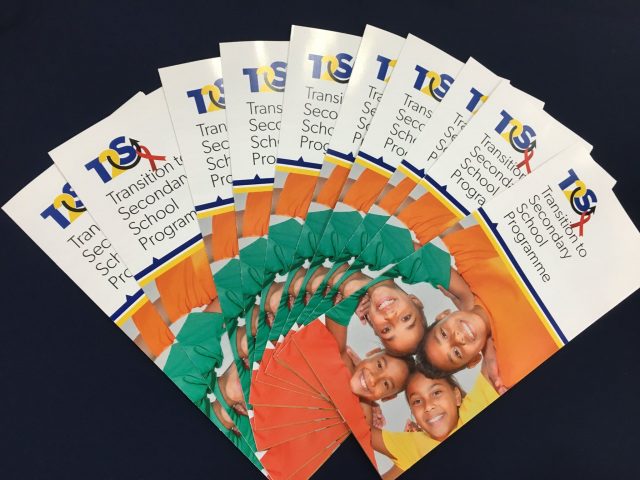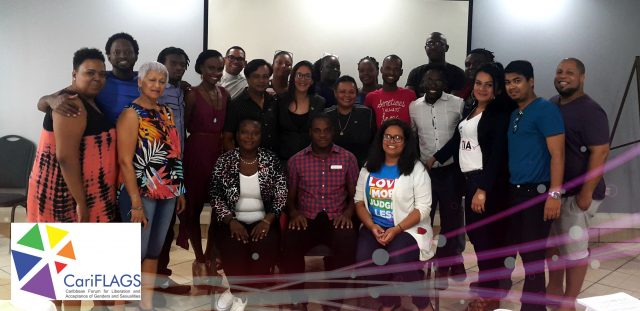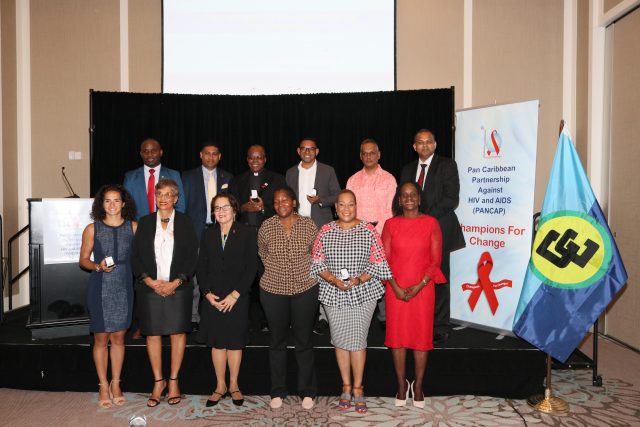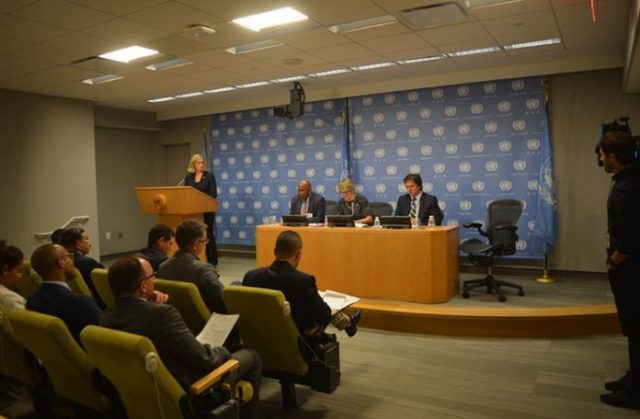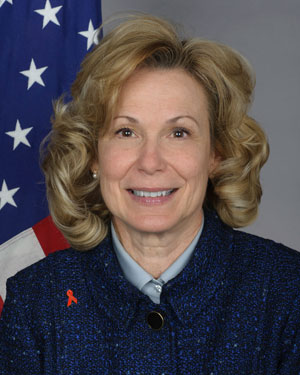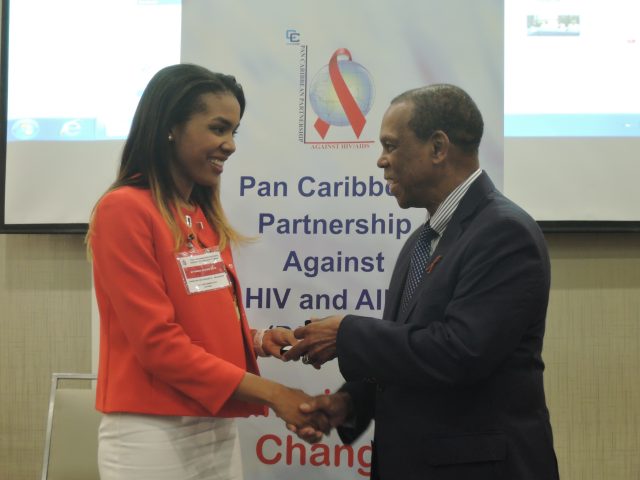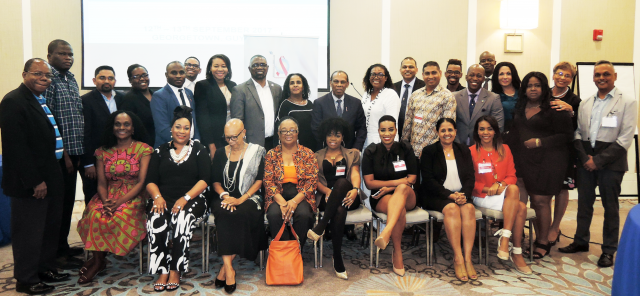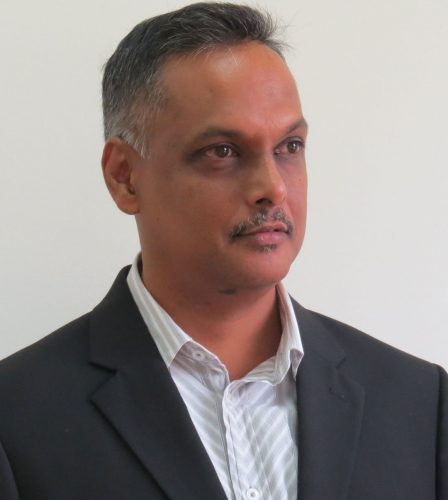PANCAP relaunched the Champions for Change initiative after an eleven-year hiatus. The two-day event was be held from Tuesday, September 12 to Wednesday, September 13 at the Guyana Marriott Hotel, Georgetown, Guyana. The keynote speaker was the Rt. Hon. Sir Charles Michael Dennis Byron, President of the Caribbean Court of Justice.
Below are profiles of each of the new Champions.
Sandra Marie Granger, First Lady of Guyana

Guyana’s First Lady was recognized for outstanding leadership and championing of the ‘Every Caribbean Woman Every Caribbean Child’ Initiative and stellar work in improving the lives of children and women in Guyana.
Profile
Sandra Marie Granger is the First Lady of the Cooperative Republic of Guyana. Since becoming First Lady, she has immersed herself in activities aimed at improving the lives of the most vulnerable sectors of the Guyanese population. She is a member of the Caribbean Community (CARICOM) Forum of First Ladies and Spouses of Heads of Government, which focusses on reducing adolescent pregnancy, cervical cancer, mother-to-child transmission of HIV, and domestic violence in the Caribbean. She is a Champion of the Every Caribbean Woman Every Caribbean Child Initiative and the United Nations Food and Agriculture Organisation’s School Feeding Programme. She holds two Bachelor of Arts Degrees in English Literature and in Portuguese, respectively, from the University of Guyana.
Dr Allyson Leacock

Dr Allyson Leacock was recognized for leadership as Executive Director of LIVE UP: The Caribbean Media Alliance and championing the HIV response in the Caribbean.
Profile
Dr Allyson Leacock is the Executive Director of LIVE UP: The Caribbean Media Alliance. She has 34 years of experience in executive management and has been involved in all aspects of broadcast media for 40 years. For the past 10 years, Dr Leacock has led a coalition of 112 Media Houses in 24 Caribbean countries as part of the LIVE UP Campaign, training over 2000 Caribbean broadcasters. She is currently on the Executive Board of the Global Media AIDS Initiative (GMAI) and served 4 years as Chairman of the Global Steering Committee for the World AIDS Campaign. Her professional training includes both Masters and Ph.D. Degrees in Educational Technology from Concordia University, Canada.
Dr Arif Bulkan

Dr Arif Bulkan was recognised for leadership in advancing the University Rights Advocacy Project and creating a safe space for LGBT students at The University of the West Indies.
Profile
Dr Arif Bulkan is an attorney-at-law who formerly practiced law in Guyana as a prosecutor and then criminal defence lawyer. He has a PhD in Law from Osgoode Hall Law School in Toronto, Canada, and currently lectures constitutional law and human rights law in the Faculty of Law of the St Augustine Campus of The University of the West Indies. As a consultant for PANCAP, Arif Bulkan produced a National Assessment on laws and policies impacting on HIV and AIDS in Guyana. He is a co-founder of The University of the West Indies Rights Advocacy Project [U-RAP], which aims to promote human rights, equality and social justice in the Caribbean through litigation and advocacy. He was conferred with the Anthony N. Sabga Award for Public and Civic Contributions in 2017.
Canon Garth Minott

Canon Garth Minott was recognized for significant work and advocacy towards greater involvement of the faith community in national and regional HIV responses.
Profile
Canon Garth Minott is the Canon of the Cathedral in the Diocese of Jamaica and the Cayman Islands, a member of the Religious Groups Steering Committee of the Jamaica Council of Churches and Chair of the board of directors of the Jamaica AIDS Support for Life and the Regional Faith Based Organisation Steering Committee to end AIDS by 2030. He lectures in the field of Practical Theology at the United Theological College of the West Indies, where he served as Deputy President for a two-year term. A graduate of the University of the West Indies and McGill University, Canon Minott has published articles in the Journal of Caribbean History, Groundings, and, the Journal for the Network of African Theological Institutions. His most recent publication was titled “Living by faith in challenging times: A Caribbean view on what it means to say ‘God will take care of us.” He is the recipient of the CIBC RBC Bank Unsung Hero Award for his work in the area of HIV and AIDS.
Dr Frank Anthony
Dr Frank Anthony was recognized for outstanding work in public health and demonstrated understanding of the critical role that parliamentarians can play in ending AIDS.

Profile
Dr Frank Anthony is a Member of Parliament and serves on the parliamentary management committee and the parliamentary standing committee on constitutional reform in Guyana. He has worked in the public health sector from 1993 to 2006 as a physician, epidemiologist and Executive Director of the Health Sector Development Unit, Ministry of Health, Guyana. Dr Anthony was the Minister of Culture, Youth and Sports a position he held from 2006 to 2015. He is currently in private medical practice. He is also an adjunct professor in epidemiology at the University of Guyana and a member of the Guyana Medical Council. Dr Anthony received has a Medical Degree from the Russian Peoples Friendship University and a Masters in Public Health from the Hebrew University, Israel.
Dwayne Gutzmer

Dwayne Gutzmer was recognised for leadership of the CARICOM Youth Ambassador Corps and youth advocacy.
Profile
Dwayne Gutzmer is the Chief Executive Officer of the Institute of Law & Economics (ILE) with direct responsibilities for the Business Entrepreneurial Empowerment Programme (BEEP) & the Urban Lab for Youth Innovation Projects. He has served as President of the Junior Chamber International, Jamaica and Dean of the CARICOM Youth Ambassador Programme. Dwayne is the co-author of the “Caribbean Youth Advocacy Guide, A Road to Development”. He holds a Bachelor of Science Degree in Computing and Information Technology from the University of Technology, Jamaica, and a Masters in Business Administration with special focus in Finance from the University of Wales, UK.
Joel Simpson

Joel Simpson was recognised for advocacy work against sexual orientation discrimination in Guyana and regionally.
Profile
Joel Simpson is the founder and Managing Director of the Society Against Sexual Orientation Discrimination (SASOD) in Guyana. He has served as the UNESCO Human Rights Researcher at the HIV Education Unit at the University of the West Indies (UWI) St. Augustine Campus in Trinidad and Human Rights Associate at the United Nations Development Programme (UNDP) country office in Guyana. He currently serves as the secretariat of the Caribbean Forum for Liberation of Genders and Sexualities (CariFLAGS). He holds a Bachelor of Laws Degree from the University of Guyana and is a Chevening scholar with a Master of Laws Degree in Human Rights Law from the University of Nottingham in the United Kingdom.
Kenita Placide

Kenita Placide was recognised for advocacy and work in the LGBT community nationally, regionally and globally.
Profile
Kenita Placide is a founding member and current Executive Director of the Eastern Caribbean Alliance for Diversity and Equality (ECADE). She is also the Caribbean Advisor for New York-based OutRight Action International. In 2009, she submitted the first written and oral presentation by United and Strong to Saint Lucia’s Constitution Reform Commission and followed with a submission to the Universal Periodic Review process at the United Nations in 2010. Kenita was instrumental in organising the first OECS regional security and human rights training for LGBT and sexual rights defenders in 2011 and a regional documentation training in 2013. She helped make history when United and Strong hosted an International Dialogue on Human Rights in 2012 with ARC International; the first of its kind in the Caribbean.
Laura Tucker-Longsworth, MSN. RN. O.B.E.

Laura Tucker-Longsworth was recognised for leadership in the HIV response and demonstrated understanding of the critical role that parliamentarians can play in ending AIDS.
Profile
Laura Tucker-Longsworth is the speaker of the National Assembly of Belize and Chairperson of the National AIDS Commission. She is an entrepreneur and owner of Nursing & Healthcare Services (NHS) Consultants Ltd. She is the Chairperson of the Disciplinary Committee for the Nurses and Midwives Council of Belize. She is the co-author of the evidenced-based paper entitled Harmonizing Nursing Education: Theory and Practice. She holds a Master’s of Science Degree in nursing from the Marcella Niehoff School of Nursing, Loyola University Chicago. She was honoured with the Most Excellent Order of the British Empire (OBE) for her contribution to Nursing and Community Service.
Lucien Govaard

Lucien Govaard was recognised for advocacy on LGBTI issues both nationally and regionally.
Profile
Lucien Govaard is the Chair of the Caribbean Forum for Liberation and Acceptance of Genders and Sexualities (CariFLAGS). He serves as the representative of this organization on the PANCAP Executive board, the Regional Coordinating Mechanism as well as other PANCAP sub-structures. As a Surinamese national, he is active in several local organizations in the fields of youth development, HIV and the wellbeing of elderly people and LGBTI+ community in particular. Advocate, youth leader and active member of the Caribbean community are some of the capacities in which he dedicates time and energy to the achievement of change. Lucien is a freelance consultant in health communication and youth development
Nicolette Fernandes

Nicolette Fernandes was recognised for utilizing her platform as a sports personality for advocacy regionally and internationally.
Profile
Nicolette Fernandes is a professional squash player who represented Guyana. She won the only gold medal for Guyana at the 2006 Central American and Caribbean Games in Colombia. She was named Guyanese Sportswoman of the year for the year 2009 by the Guyanese National Sports Commission (NSC). She also appears in the WISPA 2010 calendar, which features the top WISPA squash players. She reached a career-high world ranking of World No. 19 in October 2013.
Dr Nigel Taylor

Dr Nigel Taylor was recognised for significant work and advocacy towards greater involvement of the faith community in national and regional HIV responses.
Profile
Dr Nigel Taylor is the Minister in Charge of the Calvary Evangelical Church. He holds Doctoral Degrees in the disciplines of Theology and Psychology. He is also the President of the Barbados Evangelical Association and former Vice President of the Evangelical Association of the Caribbean. He served as Chairman of the National HIV/AIDS Commission of Barbados and engaged the denominations in the country to get involved in the response to HIV and AIDS. Dr Taylor was also part of the Barbados Delegation to The UN General Assembly Special Session on Drugs (UNGASS) and a Barbados’ representative to the 2012 AIDS Conference in Washington.
Dr Nikkiah Forbes

Dr Nikkiah Forbes was recognised for contributions as an Infectious Disease and Clinical Care Physician and contributions to the response to ending AIDS.
Profile
Dr Nikkiah Forbes is the Director of the National HIV/AIDS and Infectious Disease Programme at the Bahamas Ministry of Health. She is a Consultant in Infectious Disease at the Princess Margaret Hospital and Doctors Hospital and an Associate Lecturer at The University of the West Indies, School of Clinical Medicine and Research (SCMR), Bahamas. She graduated with honours from The University of the West Indies in surgery and was the first recipient of the SCMR’s Cecil Bethel Award as the top graduate in her class in 2002. She is actively engaged in medical research and presents her work at national, regional and international scientific meetings including the Infectious Disease Society of America of which she is a member.
Honourable Terrence Deyalsingh

Honourable Terrence Deyalsingh was recognised for leadership as a member of parliament advocating for the end of AIDS.
Profile
Honourable Terrence Deyalsingh is the Minister of Health and the Member of Parliament for St. Joseph, in the Republic of Trinidad & Tobago. Before his stint in politics, the Hon. Terrence Deyalsingh started his career as a lecturer in the Institute of Training and Development (INTAD). From 2003-2006 he was a member of the Cabinet -appointed Committee on Labour Market Reform and chaired the sub-committee on Labour Market Information, all of which derived from his passion for business management. Subsequently, Minister Deyalsingh entered the realm of politics, where he served as a Temporary Opposition Senator during the 10th Republican Parliament. He was appointed a Senator on November 2, 2010 and served until October 14, 2013, when he accepted the nomination to contest the St. Joseph constituency. During this tenure in the Parliament of Trinidad and Tobago, he has served on the Standing Orders Committee of the Senate, as well as on the Finance Committee.
Volderine Hackett

Volderine Hackett was recognised for advocacy and significant contributions to championing the HIV response in the Caribbean.
Profile
Volderine Hackett is the Deputy Programme Manager within the Communications Unit at the CARICOM Secretariat. She is a Communications Specialist with more than eighteen years’ experience in the field of information and communications; half of which has been integrally linked to the Caribbean’s response to the HIV epidemic through PANCAP. She has served as Technical Coordinator of the Inaugural Champions for Change Conference on reducing HIV and AIDS stigma and discrimination. From 2004-2010, she spearheaded the operational aspects of Champions for Change. She has served as Head of Strategic Information and Communication within the PANCAP Coordinating Unit. In addition to a Masters in Communications from the University of Leicester, she holds a Bachelor of Science in Management and a Post-Graduate Diploma in International Relations from the University of Guyana.
Rev. Winston Mansingh

Rev. Winston Mansingh was recognised for significant work and advocacy towards greater involvement of the faith community in national and regional HIV responses.
Profile
Rev. Winston Mansingh is currently the Senior Pastor of The Poonah Open Bible Miracle Centre (POBMC). He is a graduate of the Community Bible Institute, Brooklyn, New York, Open Bible Institute of Theology Trinidad & Tobago as well as the Haggai Christian Leadership & World Missions Training Institute, Maui, Hawaii. He is the President of The Faith-Based Network of Trinidad and Tobago and an Internationally Certified Educator on HIV and AIDS.
Vanessa Uziely Rosario Brito

Vanessa Uziely Rosario Brito was recognised for advocacy in human rights and facilitation of key populations access to justice in the Dominican Republic and regionally.
Profile
Ms Brito joins 16 PANCAP Champions who received their awards from Hon. Nicolette Henry, Minister of Education (Guyana) and Dr Douglas Slater, Assistant Secretary-General, Human and Social Development, CARICOM Secretariat, during the opening ceremony on Tuesday, September 12. Ms Brito was presented with her award by UNAIDS and PANCAP Advisor, Dr Edward Greene who referred to her many interventions for vulnerable groups including women and children; the Lesbian, Gay, Bisexual and Transgender (LGBT) community and persons living with or affected by HIV and AIDS. She has a Law Degree from the Catholic University of Santo Domingo, Dominican Republic and a Masters in Corporate Law from the Antonio de Nebrija University, Madrid, Spain. She is the Chairperson of the COIN Board and co-researcher on French Legislation in the field of HIV and AIDS for the University Hospital Center (CHU), Pointe-a-Pitre, Guadalupe. She is a Defense Lawyer on human rights and access to justice of vulnerable groups at the Human Rights Observatory for Vulnerable Groups of the Dominican Republic (ODHGV). Ms Brito has studied best practices in holistic education on sexuality, sexual health and Human Rights at the Cuban National Center for Sexual Education (CENESEX). She is also the Chief Executive Officer and Founder of the Foundation for Savings, Loans and Multiple Services in Primary Health Care. She has defended the right of access by the public to government information as the officer responsible in the Office of the Free Access to Public Information (National Office of Public Defense, Dominican Republic). In addition to her full-time occupation as Operations Manager in the Center of Orientation and Holistic Research (COIN), she works as an independent legal consultant.
PANCAP extends congratulations to all the new Champions and anticipates collaborating on issues related to protecting vulnerable groups and creating an enabling environment for access to prevention, care and treatment without the fear of stigma and discrimination.
Visit the official Champions for Change web page here.


